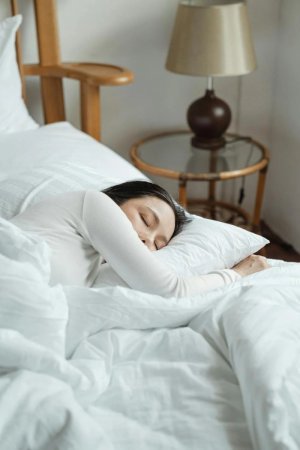Falling asleep too quickly? Experts reveal a serious health risk you need to know about
By
Veronica E.
- Replies 0
Do you fall asleep the moment your head hits the pillow?
While many people envy the ability to drift off instantly, experts say this might not be as great as it seems.
In fact, falling asleep too quickly could be a sign that your body isn’t getting the restorative rest it needs.
Sleep is essential to overall health, especially as we age, and how long it takes to fall asleep—known as sleep latency—can reveal a lot about our well-being.
The term "sleep latency" might not come up in everyday conversation, but it plays a crucial role in sleep health.
Simply put, sleep latency refers to the time it takes to go from full wakefulness to sleep.
According to the Sleep Foundation, the ideal range for most adults is between 10 and 20 minutes.
This suggests you’re tired enough to fall asleep without delay but not so exhausted that you immediately pass out.

If you consistently fall asleep in less than eight minutes, it may be time to take a closer look at your sleep patterns.
While occasional exhaustion happens to everyone, frequently falling asleep this fast could signal chronic sleep deprivation or even an underlying sleep disorder.
One possible condition is narcolepsy, a neurological disorder that causes excessive daytime sleepiness and sudden sleep attacks.
Another potential concern is sleep apnea, which disrupts breathing during sleep and often leads to extreme fatigue.
These conditions can have serious health implications, affecting everything from heart health to cognitive function.
Sleep latency isn’t fixed—it can change based on lifestyle habits, health conditions, and even daily routines. Some factors that can affect how quickly you fall asleep include:
On the other end of the spectrum, if it consistently takes you more than 20 minutes to fall asleep, you might be experiencing insomnia or another sleep-related issue.
While an occasional restless night is normal, struggling to fall asleep regularly may indicate poor sleep hygiene or an underlying condition that requires attention.
The American Academy of Sleep Medicine recommends considering all aspects of sleep health, not just latency.
If you have ongoing concerns, speaking with a healthcare professional can help identify potential causes and solutions.
If you’re worried about how quickly—or how slowly—you fall asleep, there are steps you can take to improve your sleep quality:
At The GrayVine, we believe that understanding sleep health is key to overall well-being. Sleep plays a vital role in our energy levels, brain function, and quality of life—so taking small steps to improve it can make a big difference.
Read next: New study reveals millions exposed to toxic chemicals in drinking water

Have you noticed changes in how quickly you fall asleep? Do you have any sleep tips that work for you? Share your experiences in the comments below—we’d love to hear from you!
While many people envy the ability to drift off instantly, experts say this might not be as great as it seems.
In fact, falling asleep too quickly could be a sign that your body isn’t getting the restorative rest it needs.
Sleep is essential to overall health, especially as we age, and how long it takes to fall asleep—known as sleep latency—can reveal a lot about our well-being.
Simply put, sleep latency refers to the time it takes to go from full wakefulness to sleep.
According to the Sleep Foundation, the ideal range for most adults is between 10 and 20 minutes.
This suggests you’re tired enough to fall asleep without delay but not so exhausted that you immediately pass out.

Drifting off too quickly? Experts say it could be a sign of an underlying sleep issue. Image Source: Pexels / Ketut Subiyanto.
The risks of falling asleep in under eight minutes
If you consistently fall asleep in less than eight minutes, it may be time to take a closer look at your sleep patterns.
While occasional exhaustion happens to everyone, frequently falling asleep this fast could signal chronic sleep deprivation or even an underlying sleep disorder.
One possible condition is narcolepsy, a neurological disorder that causes excessive daytime sleepiness and sudden sleep attacks.
Another potential concern is sleep apnea, which disrupts breathing during sleep and often leads to extreme fatigue.
These conditions can have serious health implications, affecting everything from heart health to cognitive function.
Also read: The secret to your best sleep ever—doctors swear by this!
What influences sleep latency?
Sleep latency isn’t fixed—it can change based on lifestyle habits, health conditions, and even daily routines. Some factors that can affect how quickly you fall asleep include:
- Sleep schedule: Going to bed earlier or later than usual can shift sleep latency.
- Diet and beverages: Eating heavy meals, consuming caffeine, or drinking alcohol close to bedtime can impact how fast you fall asleep.
- Screen time: The blue light from electronic devices can interfere with melatonin production, making it harder to sleep.
- Stress and discomfort: Emotional stress, physical pain, or an unfamiliar sleep environment can all influence how long it takes to fall asleep.
Also read: Suddenly jerking awake as you drift off to sleep? Here's the reason why!
When longer sleep latency becomes a concern
On the other end of the spectrum, if it consistently takes you more than 20 minutes to fall asleep, you might be experiencing insomnia or another sleep-related issue.
While an occasional restless night is normal, struggling to fall asleep regularly may indicate poor sleep hygiene or an underlying condition that requires attention.
The American Academy of Sleep Medicine recommends considering all aspects of sleep health, not just latency.
If you have ongoing concerns, speaking with a healthcare professional can help identify potential causes and solutions.
Also read: Struggling to sleep? Discover three simple tricks to add 90 minutes of rest tonight!
How to improve your sleep health
If you’re worried about how quickly—or how slowly—you fall asleep, there are steps you can take to improve your sleep quality:
- Create a restful sleep environment – Keep your bedroom cool, dark, and quiet.
- Establish a relaxing bedtime routine – Try calming activities like reading or taking a warm bath.
- Be mindful of diet and exercise – Avoid caffeine, alcohol, and heavy meals close to bedtime. Regular physical activity can also support better sleep.
- Limit screen time before bed – Reducing exposure to bright screens can help regulate your sleep-wake cycle.
- Seek professional guidance if needed – If you suspect an underlying sleep disorder, consulting a healthcare provider can help you find answers.
At The GrayVine, we believe that understanding sleep health is key to overall well-being. Sleep plays a vital role in our energy levels, brain function, and quality of life—so taking small steps to improve it can make a big difference.
Read next: New study reveals millions exposed to toxic chemicals in drinking water
Key Takeaways
- Falling asleep in under eight minutes regularly may be a sign of an underlying sleep disorder or sleep deprivation.
- Normal sleep latency—the time it takes to fall asleep—is typically between 10 and 20 minutes.
- Very short sleep latency could be linked to narcolepsy or other sleep disorders, according to the Sleep Foundation and Mayo Clinic.
- Sleep latency is just one aspect of overall sleep health. If concerns arise, consulting a doctor for proper evaluation and management is recommended.
Have you noticed changes in how quickly you fall asleep? Do you have any sleep tips that work for you? Share your experiences in the comments below—we’d love to hear from you!






